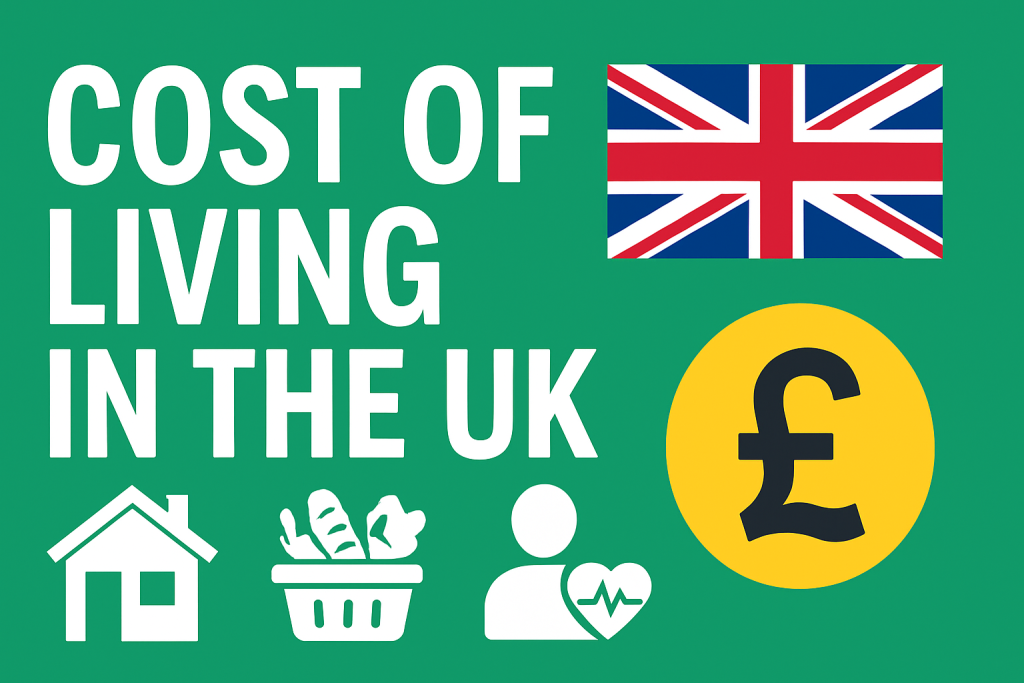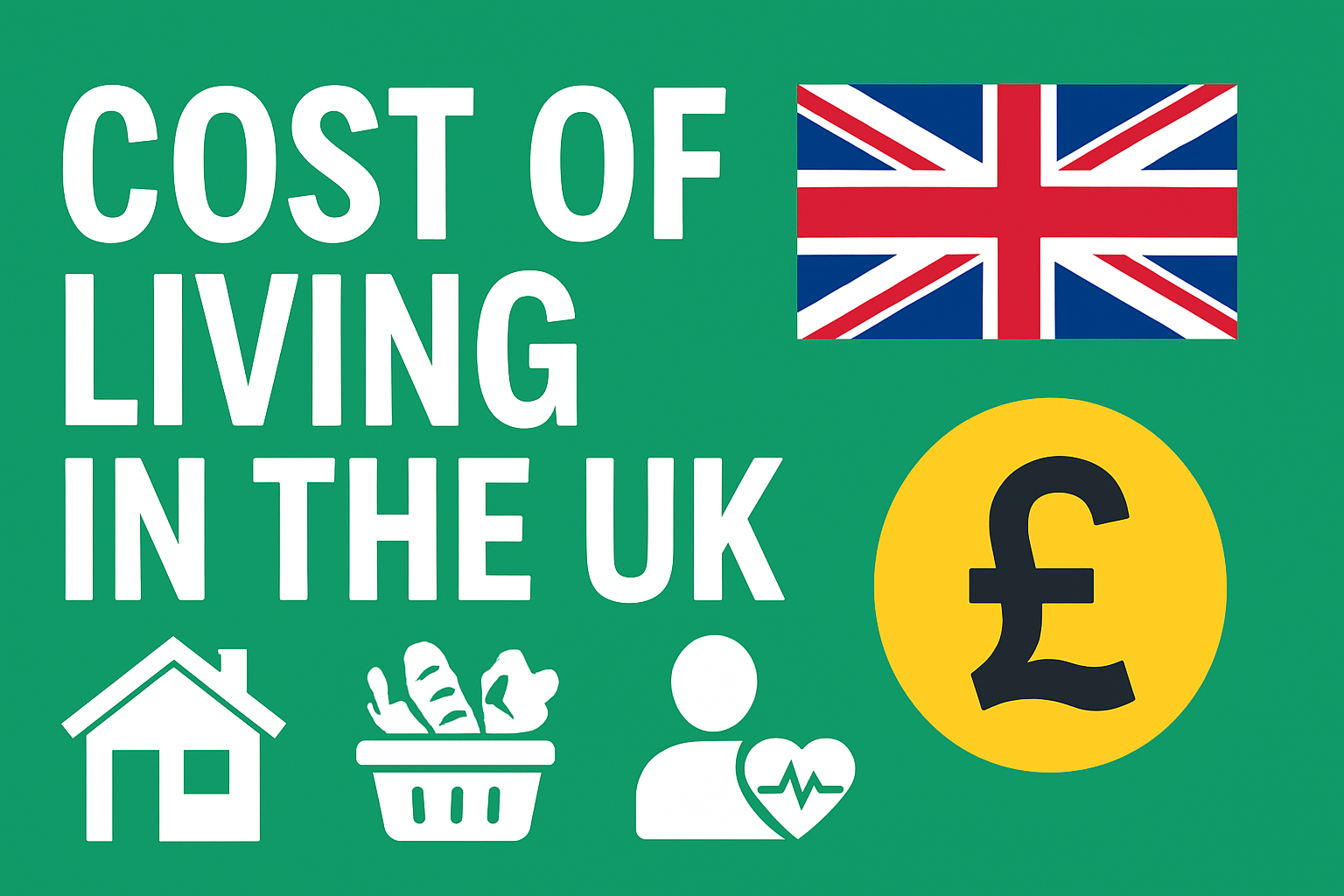Moving to or living in the United Kingdom can be exciting—but understanding the cost of living in the UK is crucial before you make any big decisions. Whether you’re planning to study, work, or settle permanently, this guide breaks down everything you need to know: from housing and food costs to transport and healthcare expenses.
Recommend: Top 10 Reasons Why Living in Saudi Arabia and Life in Saudi Arabia as an Expat
Understanding the Cost of Living in the UK
The cost of living in the UK varies significantly depending on where you live. London, for instance, is among the most expensive cities in the world, whereas northern cities such as Manchester, Leeds, and Newcastle are far more affordable.
Your lifestyle also matters—how you travel, eat, and spend leisure time all influence your monthly expenses.
Let’s dive into the key cost categories.
Housing and Accommodation Costs
Housing is the biggest expense for most UK residents.
1. Rent Prices
-
London: £1,700–£2,500/month (1-bedroom apartment in city center)
-
Manchester: £1,000–£1,300/month
-
Birmingham: £900–£1,200/month
-
Glasgow or Cardiff: £800–£1,000/month
If you’re sharing accommodation with roommates, rent can drop significantly. Many students and young professionals share flats to save on costs.
2. Utilities
Expect to pay around:
-
Electricity, water, heating, and gas: £150–£250/month (depending on season)
-
Internet: £25–£40/month
Tip: Energy prices can fluctuate, so consider investing in energy-efficient appliances and turning off unnecessary lights to save money.
Food and Groceries
Food prices in the UK are generally moderate, especially if you shop smartly.
| Type | Average Monthly Cost |
|---|---|
| Groceries (for one person) | £200–£300 |
| Eating out occasionally | £100–£200 |
| Coffee (cappuccino) | £3 – £4 |
| Fast food meal | £7 – £9 |
| Mid-range restaurant meal | £15–£25 per person |
Recommend: How to Get an Emergency Cash Loan from Saudi Al Awal Bank (SAB)
Supermarkets like Aldi, Lidl, Tesco, and Asda are great for budget shopping. Imported goods or dining in city centers can increase your expenses.
Transportation Costs
Getting around in the UK can be both convenient and costly, depending on how often and where you travel.
1. Public Transport
-
London: Monthly travel card – around £160–£200
-
Manchester or Birmingham: Around £70–£100/month
-
Single bus ticket: £2–£3
You can save by purchasing Oyster cards (London) or monthly passes.
2. Owning a Car
If you prefer driving:
-
Petrol prices average £1.45/liter.
-
Car insurance costs £400–£800/year
-
Parking fees vary from £1 to £6/hour
Owning a car in big cities like London can be expensive due to congestion charges and parking restrictions. Many residents prefer public transport or cycling.
Healthcare Expenses
The National Health Service (NHS) provides free or subsidized healthcare to UK residents and workers.
However, expats or international students may need to pay an Immigration Health Surcharge (IHS) when applying for a visa.
-
NHS Consultation: Free (if registered)
-
Private Doctor Consultation: £50–£150
Recommend: How to Get Personal Finance in Saudi Arabia as an Expat
-
Health Insurance (Private): £30–£80/month
Prescription costs in England are capped at £9.90 per item, while in Scotland, Wales, and Northern Ireland, prescriptions are free.
Education Costs
If you’re moving to the UK as a student or with a family, education costs will be a key consideration.
-
Public Schools: Free for residents.
-
Private Schools: £4,000–£8,000 per term.
-
University Tuition (International Students):
-
Undergraduate: £12,000–£25,000 per year
-
Postgraduate: £14,000–£30,000 per year
-
Living in student halls or shared flats can reduce your total monthly living costs significantly.
Entertainment and Lifestyle
Leisure activities in the UK can range from budget-friendly to luxurious.
| Activity | Average Cost |
|---|---|
| Gym membership | £30–£60/month |
| Cinema ticket | £10 – £15 |
| Pub meal | £12 – £18 |
| Weekend getaway | £150 – £300 |
The UK also offers plenty of free attractions—parks, museums, galleries, and cultural festivals—so you can enjoy life without overspending.
Average Monthly Budget for Different Cities
| City | Single Person | Family of 4 |
|---|---|---|
| London | £2,500 – £4,000 | £4,000 – £6,000 |
| Manchester | £1,800 – £2,800 | £3,000 – £4,500 |
| Birmingham | £1,700 – £2,500 | £3,000 – £4,200 |
| Glasgow | £1,500 – £2,300 | £2,800 – £4,000 |
| Cardiff | £1,400 – £2,200 | £2,700 – £3,800 |
Recommend: King Salman Park: World’s Largest Park Is Transforming Saudi Arabia
Note: Costs are approximate and can vary based on personal lifestyle, accommodation type, and energy usage.
How to Save on the Cost of Living in the UK
-
Share accommodation—roommates significantly reduce rent and utility bills.
-
Use public transport cards—monthly or annual passes are cheaper than single fares.
-
Shop smart—buy groceries in bulk from discount supermarkets.
-
Cook at home—avoid frequent takeaways.
-
Compare utility providers—websites like Compare the Market or Uswitch help find cheaper energy deals.
-
Take advantage of student discounts—many stores and transport services offer 10–30% off.
Comparison: UK vs Other Countries
| Country | Cost of Living Index | Rent Index | Notes |
|---|---|---|---|
| UK | 65.0 | 33.0 | High rent in London |
| USA | 70.0 | 42.0 | Similar food and transport |
| Germany | 60.0 | 27.0 | Cheaper rent |
| Canada | 68.0 | 35.0 | Similar standard of living |
| Australia | 73.0 | 38.0 | Slightly more expensive |
The UK’s overall living costs are moderate compared to other Western nations, but rent in major cities can push budgets higher.
Best Cities for Affordable Living in the UK
If London’s expenses seem overwhelming, consider these more affordable yet vibrant cities:
-
Leeds: Excellent balance of affordability and job opportunities.
-
Sheffield: Low housing costs and great for families.
-
Nottingham: A lively student city with modest living costs.
Recommend: How to Fill Up UK VISA Application form from Bangladesh
-
Liverpool: Friendly locals and reasonable rent.
-
Newcastle: Budget-friendly with strong public transport and nightlife.
Frequently Asked Questions (FAQ)
1. What is the average cost of living in the UK for a student?
A student typically needs around £1,000–£1,500 per month, covering accommodation, food, and transport. London students may need slightly more.
2. Is the cost of living in the UK higher than in the USA?
In general, the UK is slightly cheaper than the USA when it comes to healthcare and education, but housing in London can be more expensive than in most American cities.
3. How much salary is enough to live comfortably in the UK?
For a single person, a salary of £35,000–£40,000/year is usually enough to live comfortably outside London. In London, you might need around £50,000/year.
4. How can I check the cost of living in a specific UK city?
You can use online resources like Numbeo, Expatistan, or the UK National Statistics Office to get updated figures.
5. What’s the cheapest city to live in in the UK?
Cities like Hull, Bradford, and Dundee are among the cheapest in terms of rent, groceries, and transport.
Plan Smart and Live Better
The cost of living in the UK depends largely on where and how you choose to live. While London remains expensive, other cities offer excellent living standards at lower prices.
By budgeting wisely, sharing accommodation, and taking advantage of public services, you can enjoy a comfortable life in the UK without breaking the bank.
Call to Action
Thinking about moving to the UK? Start by researching your preferred city, comparing rent prices, and planning your budget today!
Check out our related guides on:
-
Best Cities to Live in the UK for Expats
-
How to Find Jobs in the UK for Foreigners
-
Student Visa and Living Cost Requirements in the UK



